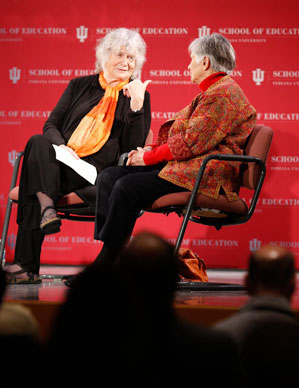IU's new Harmony-Meier Institute to explore issues of democracy and equity in education
Launch event features education reform leader Deborah Meier and U.S. v. Windsor attorney Roberta Kaplan
The Indiana University School of Education will launch the Harmony-Meier Institute for Democracy and Equity in Education with a panel discussion exploring issues of democracy and equity in education and the associated legal implications for today’s schools.
The public event, at 6 p.m. Wednesday, March 25, in the IU Auditorium lobby, is the formal kickoff for the Harmony-Meier Institute, a collaboration between the IU School of Education, the Harmony Education Center in Bloomington and IU’s Lilly Library. The institute's mission is to proliferate the values and practice of democracy and equity in education.
The institute carries the name of Deborah Meier and the Harmony Education Center. Harmony, which started with Harmony School in 1974 and now also includes Rhino’s Youth Media Center and All-Ages Club as well as the headquarters for the National School Reform Faculty professional development initiative, is dedicated to preparing young people to live in and contribute to a heterogeneous democratic society. Meier is an educator, writer and advocate, and she is one of the country’s most acclaimed school reform movement leaders. In 2009, she donated her papers to the Lilly Library to establish the Deborah Meier Archive.
Meier will be part of the panel discussion with Roberta Kaplan, the lead attorney in the landmark Supreme Court case United States v. Windsor that ruled significant portions of the 1996 Defense of Marriage Act unconstitutional. The other panelists are Kevin Brown, the Richard S. Melvin Professor of Law at the Mauer School of Law at IU Bloomington. Brown teaches courses on law and education, race and American society and is author of the book "Race, Law and Education in the Post Desegregation Era."
Steve “Roc” Bonchek, executive director of the Harmony School since 1974 and its founder, will also join the discussion. James Damico, director of the IU School of Education's Inspire Living-Learning Center and associate professor of literacy, culture and language education, will moderate the discussion. Bonchek and Damico are co-directors of the Harmony-Meier Institute.
Meier is considered the founder of the small schools movement. She began her career as a kindergarten teacher and in 1974 became the founder and director of the alternative Central Park East School in New York City. The school embraced progressive ideals in the tradition of John Dewey in an effort to provide better education for children in East Harlem.
Meier later founded the Central Park East Secondary School and became the founding principal of Mission Hill School within the Boston Public Schools system. In 1987, Meier became the first teacher or principal to receive a MacArthur Fellowship, known popularly as “The Genius Grant.”
A prolific author and speaker, Meier is faculty in New York University's Steinhardt School of Education; serves as board member and director of New Ventures at Mission Hill and as director and advisor to the Forum for Democracy and Education; and sits on the Executive Board of The Coalition of Essential Schools
Kaplan has been described as a “litigation superstar” and successfully argued before the United States Supreme Court on behalf of her client Edith Windsor in the landmark Supreme Court case United States v. Windsor.
In Windsor, the nation's highest court ruled that a key provision of the Defense of Marriage Act violated the U.S. Constitution by barring legally married same-sex couples from enjoying the wide-ranging benefits of marriage conferred under federal law. The consequences of the Windsor decision have been both rapid and profound. Literally dozens of courts throughout the United States have explicitly relied on Windsor to extend equal rights to gay people under the law. Professor Lawrence Tribe of Harvard Law School has observed that he cannot "think of any Supreme Court decision in history that has ever created so rapid and broad a lower-court groundswell in a single direction as Windsor."
The Harmony-Meier Institute will work to fulfil its mission by leveraging the resources of:
- The Deborah Meier Archives, housed at the Lilly Library, to inform and inspire researchers and practicing educators and to infuse the teacher preparation experience of IU pre-service teachers with models of democratic education. The Lilly Library is the principal rare books, manuscripts and special collections repository of Indiana University, serving as a resource for scholars throughout the world as well as a center of cultural enrichment. Lilly Library holdings include about 400,000 books, more than 100,000 pieces of sheet music and more than 7.5 million manuscripts.
- The Bloomington-based Harmony School to provide IU pre-service teachers with field experiences rooted in the practice of democratic education. Founded in 1974, Harmony School's mission is to prepare young people to live in and contribute to a heterogeneous democratic country. Harmony works to do this through teaching young people about the delicate balance needed in a democracy between individual growth and community responsibility.
- The IU School of Education Inspire Living-Learning Center to imbue participating pre-service teachers with living and learning experiences that encourage exploration of issues pertaining to democracy and equity in education. The Inspire Living-Learning Center is a diverse community of motivated, creative undergraduate students focused on making a difference in the lives of children, youth and adults. Inspire programming complements School of Education curriculum through seminar discussions, service-learning experiences and special events with faculty members, alumni and community partners.
The Harmony-Meier Institute aims to educate, serve and inspire practicing K-12 teachers, pre-service teachers, educators more broadly, and all interested citizens. This event celebrates the first in a series of events that will focus on democracy, equity and the issues that have an impact on the education of today's youth.
 Deborah Meier, left, speaking to education activist Diane Ravitch during an event at Indiana University on April 27, 2011.
Deborah Meier, left, speaking to education activist Diane Ravitch during an event at Indiana University on April 27, 2011.